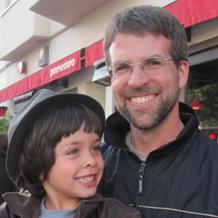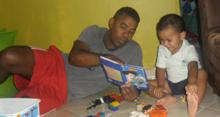The Daddy Shift
Big Ideas
Leading thinkers and activists share game-changing ideas about motherhood and improving maternal health and women's rights.

In 1946, when my grandfather mustered out of the army and married my grandmother, he set up what looked like the ideal family at the time. His wife quit her job and he started work driving a crane in a quarry—a job he would do for the next forty years, working up to six days a week, sometimes 12 hours a day. When I asked him if he faced any challenges raising his three children, he replied, “I never did. My wife took care of all that. She brought the kids up.” This arrangement came with a rigid hierarchy: “She worked for me,” said my grandfather of his wife. “I always said, ‘You work for me.’”
By the time my mother and father met in 1963, the same year that Betty Friedan published The Feminine Mystique, more and more people were starting to question this division of labor between men and women. The following year, the Unites States Congress formally abolished sex discrimination at work. I was born in 1970. “I wanted to be closer to you than my father was to me,” my dad told me when I interviewed him for my book, The Daddy Shift. “I wanted to participate more in my kids’ lives.” Even so, my parents never questioned for a moment that he would make most of the money and she would change most of the diapers.
By 1988—the year I graduated from high school—only 29 percent of children lived in two-parent families with a full-time homemaking mother. And like many Baby Boomer couples, my parents split in 1991—the same year I met the woman who is today my wife. By the time we became parents in 2004, my wife and I were stepping into a family landscape that was totally different from the one my grandparents faced in 1946.
For one thing, we never assumed that one of us was the natural breadwinner and the other a natural caregiver—instead, we saw those as roles that we would share and negotiate over time. For a year, I took care of my son while my wife went to work, and as we visited playgrounds, I met many other dads who took care of their kids while their female partners were at work.
This personal reality reflects one that has been empirically measured. For almost every decade for the past 100 years, more and more women in the United States have gone to college and work. Over the past three years, men have been much more likely to lose their jobs than women, who are concentrated in fast-growing, high-skill industries like health care and education. Between 2009 and 2010, men with college degrees saw their median weekly earnings drop 3 percent while the income of women with degrees grew by 4.3 percent. Today, young women’s pay exceeds that of their male peers in most metropolitan areas. Not coincidentally, fathers now spend more time with their children and on housework than at any time since researchers started collecting comparable data. I call it “the daddy shift” — the gradual movement away from a definition of fatherhood as pure breadwinning to one that encompasses a capacity of caregiving.
The right-wing “family values” movement has painted these trends as a crisis, but no one I know experiences them that way. Instead, we seem to share a positive (if often unarticulated) vision of the family as diverse, egalitarian, voluntary, interdependent, flexible, and improvisational. Many people hold these ideals without necessarily being conscious of their political and economic implications—and they’re not making politically motivated choices. In researching The Daddy Shift, for example, I didn’t interview any breadwinning moms and caregiving dads who adopted their reverse-traditional arrangement for feminist reasons. They almost always framed their work and care decisions as a practical matter, a response to brutally competitive labor and childcare markets.
Indeed, I don’t believe that a political force like feminism has driven men and women to share roles more equally; it seems more accurate to say that feminism has tried to teach people to personally adapt to broad, deep economic and technological changes that made equality more possible and desirable—and the movement has fought for public policies that would support our new roles at home and at work. Rising inequality and economic instability has meant that many families can’t afford specialists anymore, with one focused on career and the other exclusively on taking care of the family. And so couples are moving from a family model that prioritizes efficiency to one that tries to build resilience in the face of economic shocks. In the ideal resilient family, both women and men are capable of working for pay and working at home.
But families often fall short of this ideal, partially because of lingering structural and interpersonal sexism, and partially because men lack support for their new caregiving roles at both home and work. Studies consistently show that 80 percent to 90 percent of mothers still expect fathers to serve as primary breadwinners (and very few will consider supporting a stay-at-home dad). At work, only 7 percent of American men have access to paid parental leave, among other structural limitations.
How can the daddy shift continue? The to-do list is long. It includes an education campaign to help men of all social classes understand what workplace and public policies can help them be the fathers they want to be — and legal campaigns that will defend their jobs against backward attitudes at work. Men whose mindsets are still shaped by the sole-breadwinner ideal need explicit permission and encouragement from both their female partners and their bosses to take advantage of leave policies and participate in family life.
We also need to shift the language we use to discuss work-family issues in a more inclusive direction, so that it includes fathers as well as mothers. That language should stress resilience and meaning to men instead of the language of equality that has mobilized women. In the end, it's up to guys to tell the stories of our lives and speak up for what we want. No one will do it for us.
Related Content
|
Márcio Chagas da Paz is a father who collaborates with Promundo, a Brazilian NGO that seeks to promote gender equality and end violence against women, children, and youth. |
In Burundi culture, gender roles are strictly defined. Women and mothers have little power in their marriages and communities. Learn how Hatungimana Sylvestre is working to change these norms. |
With more men willing to take an active role as fathers, rather than just be the family breadwinner, it seems we’ve come a long way toward gender equality in parenting—or have we? |
This documentary follows a family in Hungary where the father stays home as caretaker and the mother is the primary breadwinner. |





